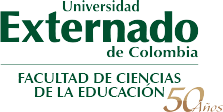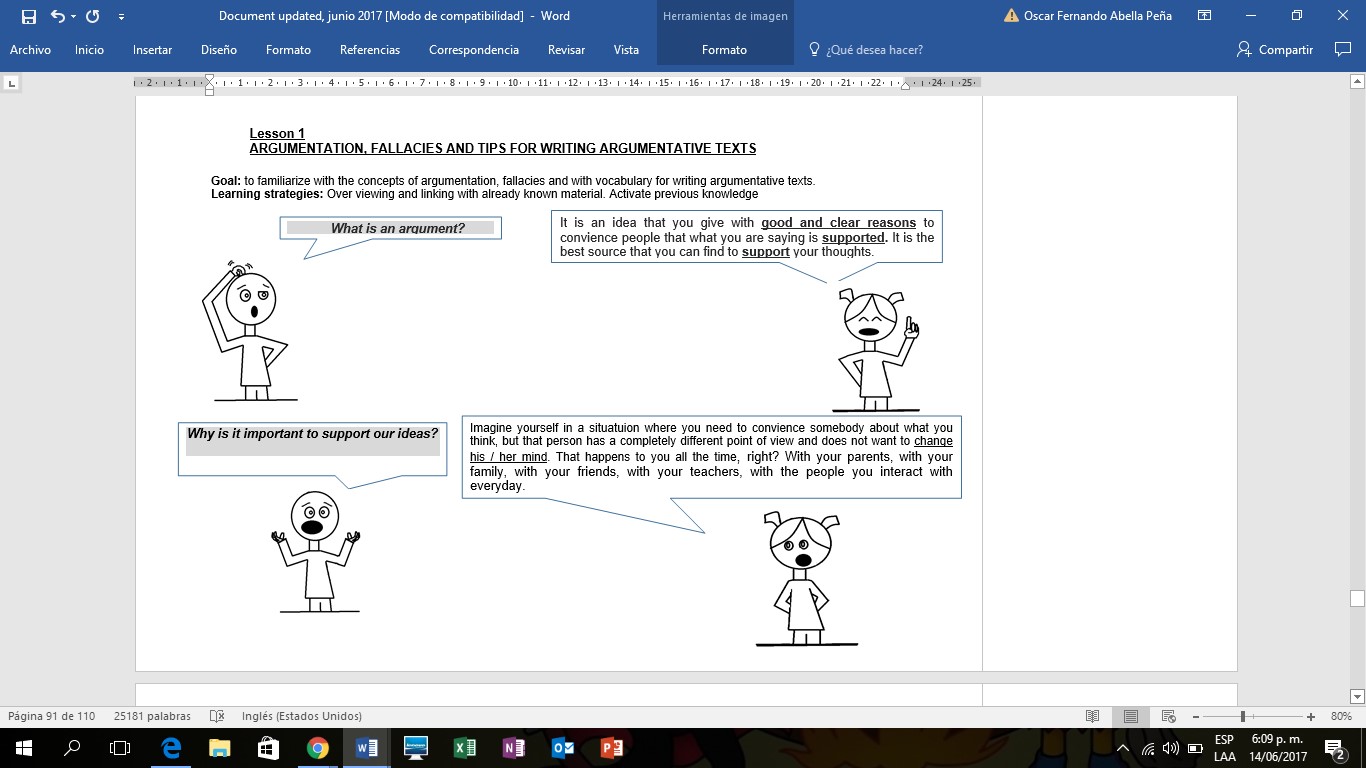25 de julio de 2018
Portfolios Focused on Controversial Issues to Expand Argumentative Writing Skills
This article describes how the implementation of teacher designed portfolios favor the development of students’ argumentative writing skills in English. It presents the main concepts of argumentative writing skills and explains how the implementation of controversial issues contributes to the development of these abilities. Finally, it presents how the teacher-designed portfolios benefits students’ writing process.
Por: Oscar Fernando Abella Peña M.A.
This article describes how the implementation of teacher designed portfolios favor the development of students’ argumentative writing skills in English. It presents the main concepts of argumentative writing skills and explains how the implementation of controversial issues contributes to the development of these abilities. Finally, it presents how the teacher-designed portfolios benefits students’ writing process.
Portfolios are materials that evidence students’ knowledge and abilities, and connect instruction with assessment. According to Delett, Barnhardt, and Kevorkian (as cited in Lo, 2010), this type of materials allows the teacher to observe learner’s progress, and encourage them to ponder their own processes. The progress portfolio is suitable to follow writing processes because it focuses on students’ improvement and its content includes an introductory section, an academic works section, and an assessment section (Martín & Cárdenas, 2014). By implementing this type of portfolios, the teacher can follow and describe the development of the students’ writing process. Besides that, the educator can analyze the progression in terms of the elaboration of written arguments while students analyze their own production and their performance.
The development of argumentative writing skills has two evident elements: writing and argumentation. On the one hand, writing is framed within literacy and, as explained by Wray (2004), it is a process in which people culturally code significant information. Taking this aspect into consideration, writing is the ability to understand texts from the context, interpret them and explain them in a communicative way. On the other hand, argumentation deals with giving arguments, which is more than stating a point of view; it is the attempt of supporting points of view with reasons (Weston, 2009). Both elements define the skills required to write argumentative texts. These skills are related to the abilities to support ideas properly, and avoid fallacies in a written text.
A strategy to link writing to argumentation and then developing argumentative writing skills is the inclusion of controversial issues, which are “important policies or proposals on which conflicting views are held by large numbers of people in schools, community and nation” (The School District of Philadelphia, 1990, p. 1). These issues are reasons to consider in writing because they allow students to develop writing skills in a more critical and purposeful way. Then, considering that a skill is “the ability, coming from one’s knowledge, practice, aptitude, etc., to do something well” (Dictionary.com, 2016), and that argumentative writing is a type of writing in which elements of argumentation, such as well supported reasons and evidence, are properly exposed (Hillocks, 2011), argumentative writing skills are the abilities to write and communicate a claim where the elements of argumentation mentioned before are properly articulated.
Considering the previous assertions, the development of argumentative writing skills can be favored by the implementation of teacher-designed portfolios that not only inform students about argumentation, but that also guide them through the building of short texts based on controversial issues. In this sense, these materials facilitate working on students’ socio-cultural aspects as they are sources that permit “linguistic interaction … cultural exchanges, … [and] allow flow of knowledge” (Núñez, Téllez & Castellanos, 2013, p. 10). The portfolios can include short texts, concrete learning activities, and an evaluation of the activities focused on the content and the arguments, rather than on the perfect use of grammar. The writing activities can be related to controversial issues and to students’ lives, and they are conceived to make students feel the need to express a point of view. These aspects help students learn to write texts in the English language while studying additional content, which is known as the Content and Language Integrated Learning approach (CLIL) (Ruiz & Jiménez, 2009). Students are also given the opportunity to be creative and feel connected to the portfolios by customizing and decorating them. Finally, the teacher should give constructive feedback on the argumentative short texts, so students can improve them with no negative consequences on their marks.
To sum up, writing must be taught and learnt with communicative purposes in mind, and having students elaborate arguments in a written text is a meaningful way to foster the development of their argumentative writing skills. The portfolios make possible that learners approach the concepts of argumentation, which increases their chances of producing argumentative texts. The controversial issues offer reasons to write because these topics trigger students’ needs of expressing a standpoint. When pupils interpret, judge and apply multiple criteria to assume a position towards a controversial statement, they carry out a critical thinking process (Pineda et al. 2004). Considering this in the teaching of writing, this skill is not just an academic requirement, but an important contribution to the education of socially-aware human beings.
References
Lo, Y. (2010). Implementing reflective portfolios for promoting autonomous learning among EFL college students in Taiwan. Language Teaching Research, 14(1), 77-95.
Martín Celis, Y., & Cárdenas, M. (2014). Promoting adolescent EFL students’ decision-making through work plans gathered in their portfolios. Folios, 0(39). Retrieved from http://revistas.pedagogica.edu.co/index.php/RF/article/view/2356/2214
Núñez, A., Téllez, M., & Castellanos, J. (2013). Document: Proposal for the research line materials development and didactics (Ascribed to the Research Group: Critical Pedagogy and Didactics for Social Transformation). Bogotá, Colombia: Universidad Externado de Colombia.
Pineda, C., Núñez, A., & Téllez M., (2004). Unidades didácticas relacionadas con pensamiento crítico: Una alternativa para fomentar la competencia lingüística en lengua extranjera. Apuntes Contables, 65-78 Bogotá, Colombia: Universidad Externado de Colombia.
Ruiz, Y., & Jiménez R. (2009). Content and language integrated learning: Evidence from research in Europe. Bristol, UK: Multilingual Matters.
The school District of Philadelphia. (1990). Controversial issues. Retrieved from: https://www.philasd.org/src/wp-content/uploads/sites/80/2017/07/119-REFORMATTED.pdf
Wray, D. (2004). Literacy: Major themes in education. New York, NY: Routledge Falmer.


